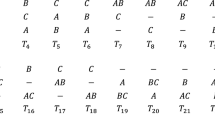Abstract
In this paper strategic situations of voting and abstentions are analysed in a three-candidate voting model where voters are indifferent to various alternatives and candidates are interested in winning the election and seeing their most preferred alternative being realized. A specific decision problem is analysed, described by an Indifference Trap Game, with respect to, e.g., the corresponding Nash equilibria, perfect equilibria, and maximin solution. A second-best outcome is contained in the choice set of all three solutions while the Nash equilibrium concept is compatible with the Pareto efficient outcomes of the game.
An alternative scenario where candidates suffer from incumbency but voters still are indifferent to some alternatives also supports the second-best outcome. Again, various solutions concepts are applied. We conclude that indifferent voters imply an eminent coordination problem for the candidates in the given voting game which, in general, ends up in inefficient outcomes. The inherent complexity of the decision situation cannot be sufficiently reduced to single out one and only one outcome.
Similar content being viewed by others
References
Brennan, Geoffrey & Loren, Lomansky (1984). “Inefficient unanimity”, Journal of Applied Philosophy 1: 151–163.
Diekmann, Andreas (1985). “Volunteer's dilemma”, Journal of Conflict Resolution 29: 605–610.
Diekmann, Andreas (1986). “Volunteer's dilemma. A social trap without a dominant strategy and some empirical results”, in A. Diekmann & P. Mitter (eds), Paradoxical Effects of Social Behavior. Essays in Honor of Anatol Rapoport. Heidelberg and Vienna: Physica-Verlag.
Fraser, Niall & Marc, Kilgour (1986). “Nonstrict 2×2 games: a comprehensive computer assisted analysis of the 726 possibilities”, Theory and Decision 20: 99–121.
Gibbard, Allen (1973). “Manipulation of voting schemes: a general result”, Econometrica 41: 587–601.
Harsanyi, John C. (1955). “Cardinal welfare, individualistic ethnics, and interpersonal comparisons of utility”, Journal of Political Economy 63: 309–321.
Harsanyi, John C. (1975). “The tracing procedure: a Bayesian approach to defining a solution for n-person non-cooperative games”, International Journal of Game Theory 4: 61–95.
Harsanyi, John C. (1977). Rational Behavior and Bargaining Equilibrium in Games and Social Situations. Cambridge: Cambridge University Press.
Holler, Manfred J. (1980), “What is paradoxical about the voting paradox?”, Quality & Quantity 14: 679–685.
Holler, Manfred J. (1982). “The relevance of the voting paradox: a restatement”, Quality & Quantity 16: 43–53.
Holler, Manfred J. (1968a). “Moral sentiments and self-interest reconsidered”, in A. Diekmann & P. Mitter (eds), Paradoxical Effects of Social Behavior. Essays in Honor of Anatol Rapoport. Heidelberg and Wien: Physica-Verlag.
Holler, Manfred J. (1986b). “Trading markets and entry costs”, Memo 1983-3, Institute of Economics, University of Aarhus.
Kalai, Ehud & Meir, Smorodinsky (1975). “Other solutions to Nash's bargaining problem”, Econometrica 43: 513–518.
Kreps, David M. & Robert, Wilson (1982a). “Reputation and imperfect information”, Journal of Economic Theory 27: 253–279.
Kreps, David M. & Robert, Wilson (1982b). “Sequential equilibria”, Econometrica 50: 863–894.
Milgrom, Paul & John, Roberts (1982). “Limit pricing and entry under incomplete information: an equilibrium analysis”, Econometrica 50: 443–459.
Miller, Nicholas R. (1982). “Power in game forms”, in Manfred J. Holler (ed.), Power, Voting, and Voting Power. Würzburg and Vienna: Physica-Verlag.
Nash, John F. (1951). “Non-cooperative games”, Annals of Mathematics 54: 286–295.
Nash, John F., Jr (1950). “The bargaining problem”, Econometrica 18: 155–162.
Owen, Guillermo (1982). Game Theory, 2nd edn. Orlando: Academic Press.
Rapoport, Anatol & Albert M. Chammah (1965). Prisomer's Dilemma. Ann Arbor: University of Michigan Press.
Roth, Alvin E. (1979). Axiomatic Models of Bargaining. Berlin: Springer-Verlag.
Schotter, Andrew (1981). The Economic Theory of Social Institutions, Cambridge: Cambridge University Press.
Selten, Reinhard (1975). “Re-examination of the perfectness concept for equilibrium points in extensive games”, International Journal of Game Theory 4: 25–55.
Wittman, Donald (1983). “Candidate motivation: a synthesis”, American Political Science Review 77: 142–157.
Wittman, Donald (1985). “Counter-intuitive results in game theory”, European Journal of Political Economy 1: 77–89.
Author information
Authors and Affiliations
Rights and permissions
About this article
Cite this article
Holler, M.J. An indifference trap of voting. Qual Quant 22, 279–292 (1988). https://doi.org/10.1007/BF00183541
Issue Date:
DOI: https://doi.org/10.1007/BF00183541




